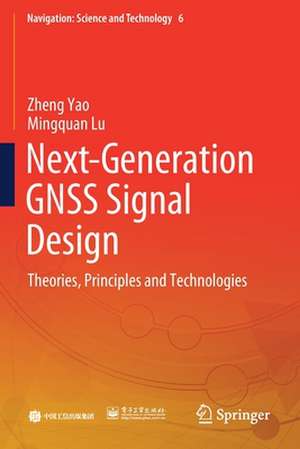Next-Generation GNSS Signal Design: Theories, Principles and Technologies: Navigation: Science and Technology, cartea 6
Autor Zheng Yao, Mingquan Luen Limba Engleză Paperback – 2 iul 2021
| Toate formatele și edițiile | Preț | Express |
|---|---|---|
| Paperback (1) | 1218.69 lei 6-8 săpt. | |
| Springer Nature Singapore – 2 iul 2021 | 1218.69 lei 6-8 săpt. | |
| Hardback (1) | 1224.68 lei 6-8 săpt. | |
| Springer Nature Singapore – 2 iul 2020 | 1224.68 lei 6-8 săpt. |
Preț: 1218.69 lei
Preț vechi: 1486.21 lei
-18% Nou
Puncte Express: 1828
Preț estimativ în valută:
233.19€ • 244.13$ • 192.95£
233.19€ • 244.13$ • 192.95£
Carte tipărită la comandă
Livrare economică 05-19 aprilie
Preluare comenzi: 021 569.72.76
Specificații
ISBN-13: 9789811558016
ISBN-10: 9811558019
Ilustrații: XXIV, 310 p. 110 illus., 76 illus. in color.
Dimensiuni: 155 x 235 mm
Greutate: 0.47 kg
Ediția:1st ed. 2021
Editura: Springer Nature Singapore
Colecția Springer
Seria Navigation: Science and Technology
Locul publicării:Singapore, Singapore
ISBN-10: 9811558019
Ilustrații: XXIV, 310 p. 110 illus., 76 illus. in color.
Dimensiuni: 155 x 235 mm
Greutate: 0.47 kg
Ediția:1st ed. 2021
Editura: Springer Nature Singapore
Colecția Springer
Seria Navigation: Science and Technology
Locul publicării:Singapore, Singapore
Cuprins
Introduction.- Satellite navigation signals.- Basic properties of DSSS signals.- Spreading modulations in satellite navigation.- Performances of spreading modulations.- Fundamental of constant envelope multiplexing.- Implementation of constant envelope multiplexing.
Notă biografică
Dr. Zheng Yao received his B.E. degree in electronics information engineering and his Ph.D. degrees in information and communication engineering from Tsinghua University, Beijing, China, in 2005 and 2010, respectively, where he is currently an Associate Professor with the Department of Electronic Engineering. He is the main inventor of asymmetric constant envelope binary offset carrier and quadrature multiplexed binary offset carrier modulations, which are employed in the BeiDou Navigation Satellite System (BDS) B2 and B1 civil signals, respectively. His primary areas of interest include the next-generation satellite navigation signals design, software-defined GNSS receiver, wireless localization technologies, and personal and vehicular positioning in challenging environments.
Dr. Yao is a Senior Member of Institute of Electrical and Electronic Engineers (IEEE) and Institute of Navigation (ION). He has also been a Technical Program Chair and a Section Chair of several international conferences. He is the recipient of the 2017 ION Early Achievement Award, in recognition to his pioneering contributions in developing new GNSS signals and multiplexing techniques; and advancing the Chinese BDS signal design. He also received the 2008 Student Paper Award from the U.S. Institute of Navigation and the 2010 and 2013 Best Paper Awards from the China Satellite Navigation Conference. Dr. Mingquan Lu received the M.E. and Ph.D. degrees in electrical engineering from the University of Electronic Science and Technology of China, Chengdu. He is a professor with the Department of Electronic Engineering, Tsinghua University, Beijing, China. He directs the Positioning, Navigation, and Timing (PNT) Research Center, which develops global navigation satellite system (GNSS) and other PNT technologies. His current research interests include GNSS modeling and simulation, signal design and processing, and receiver development.
Dr. Yao is a Senior Member of Institute of Electrical and Electronic Engineers (IEEE) and Institute of Navigation (ION). He has also been a Technical Program Chair and a Section Chair of several international conferences. He is the recipient of the 2017 ION Early Achievement Award, in recognition to his pioneering contributions in developing new GNSS signals and multiplexing techniques; and advancing the Chinese BDS signal design. He also received the 2008 Student Paper Award from the U.S. Institute of Navigation and the 2010 and 2013 Best Paper Awards from the China Satellite Navigation Conference. Dr. Mingquan Lu received the M.E. and Ph.D. degrees in electrical engineering from the University of Electronic Science and Technology of China, Chengdu. He is a professor with the Department of Electronic Engineering, Tsinghua University, Beijing, China. He directs the Positioning, Navigation, and Timing (PNT) Research Center, which develops global navigation satellite system (GNSS) and other PNT technologies. His current research interests include GNSS modeling and simulation, signal design and processing, and receiver development.
Textul de pe ultima copertă
This book systematically discusses the signal design theory and technologies for next-generation satellite navigation systems. It provides comprehensive information on the basic concept, theory, and key technologies employed in satellite navigation system signal design. Starting from the basic elements of the navigation signal, it combines traditional and advanced technologies into an organic whole, offering readers a complete system for signal design. Thanks to its rich content and clear structure, it is well suited as a reference guide for researchers and engineers in the fields of satellite navigation, positioning, etc. The book can also be used as teaching material or supplemental reading material by professors and graduate students alike.
Caracteristici
Systematically discusses signal design theory and technologies for next-generation satellite navigation systems Offers comprehensive information on the basic concept, theory, and key technologies in satellite navigation system signal design Combines traditional and advanced technologies into an organic framework












